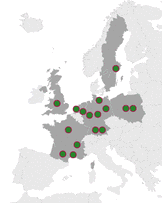Statement on the study acronyme dsd-LIFE
We started this European research project under the acronym “dsd-LIFE”. This was a reference to the medical term DSD (“disorders of sex development”) introduced in the 2006 Consensus Statement[1]. The term encompasses a number of medical conditions caused by hormonal, gonadal or chromosomal imbalances affecting sex development.
In the early stages of the project, we profited from extensive advice from advocacy and support groups covering Intersex, AIS, CAH, Klinefelter Syndrome and Turner Syndrome[2]. We conducted a pre-survey asking these groups what general and ethical issues they felt should be studied. We received 36 responses. Both communication with the support groups and feedback from this pre-survey indicated that the project acronym may lead to misunderstanding concerning the aim of our study. Some individuals and support groups do not accept the term DSD with regard to their situation. Using “disorder” within the term DSD was often mentioned as pathologising affected persons. One of the respondents put it as follows: “Using language like ‘disorder’ immediately puts one outside normal and stigmatises!”(P14). Another result of the pre-survey was that even if persons acknowledged the medical term for their specific diagnosis they rejected the term DSD because they could not identify themselves with it. Since the views of the affected persons are of utmost importance in our project, and since we would appreciate participation from as many persons as possible, we discussed changing the project acronym. But difficulties arose, both technical (web domain) and contractual (EU governance).
Even though we could not change the acronym we wish to address the issue of terminology within our study. We acknowledge the plurality of the diagnoses that are subsumed under the term DSD and the difficulties that emerge from using the term. We hope that the results will stimulate further debate on a change for a better terminology.
[1] Hughes et al. 2006: Consensus Statement on Management of Intersex Disorders
[2]AGS-Initiative (Germany); AISSG (UK and European sister groups); CAH patient organisation (Netherlands); DSDNederland (Netherlands); GrApSIA (Spain); INIS (Sweden); Intersexuelle Menschen (Germany); ISSA (Southafrica); Klinefelter’s Syndrome Association (UK); Selbsthilfe Intersexualität (Switzerland); Transgender Luxembourg (Luxembourg); XY-Frauen und XY-Eltern (Germany)


